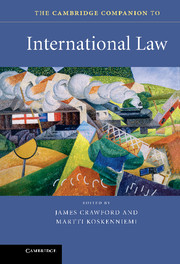Book contents
- Frontmatter
- Contents
- Preface
- Notes on contributors
- Introduction
- Part I The contexts of international law
- Part II International law and the state
- Part III Techniques and arenas
- 8 Law-making and sources
- 9 International courts
- 10 International institutions
- 11 International law and the relativities of enforcement
- Part IV Projects of international law
- Guide to electronic sources of international law
- International law chronology
- Select guide to further reading
- Index
- References
8 - Law-making and sources
from Part III - Techniques and arenas
Published online by Cambridge University Press: 05 July 2015
- Frontmatter
- Contents
- Preface
- Notes on contributors
- Introduction
- Part I The contexts of international law
- Part II International law and the state
- Part III Techniques and arenas
- 8 Law-making and sources
- 9 International courts
- 10 International institutions
- 11 International law and the relativities of enforcement
- Part IV Projects of international law
- Guide to electronic sources of international law
- International law chronology
- Select guide to further reading
- Index
- References
Summary
Introduction
International law is constantly under challenge as a legal system. Some scholars depict it as weak, mutable, unstable (Morgenthau 1948, 284), some as the mere product of states maximising their interests (Goldsmith and Posner 2005), some point to it as the framework of many mundane activities, for example as the basis of airline travel or international postal services (Henkin 1979, 29–30), while others explain its value as a ‘placemarker for justice’ or as a vehicle for the ‘regulative ideal of the international community’ (Koskenniemi 2007, 30). Perhaps because there is so much anxiety about whether international law can claim to be a branch of law, the topic of the making and sources of international law dominates most introductory works. It is as if pinning down the well-springs of international law will provide certainty and authority for the discipline.
Where does international law come from? The sources of international law are a complex tangle of ideas, commitments and aspirations. In national legal systems, law is typically regarded as the product of legislatures or court systems; it is relatively straightforward to identify the legal principle at stake in a dispute, even if there is debate about its application in a particular case. There are also institutions at the national level that enforce the law, such as police forces and civil authorities, reinforcing the significance of legal status. By contrast, modern international law is to some extent the product of the behaviour and agreement of states, and to some extent the product of abstract values such as ‘humanity’ (Peters 2009), ‘fairness’ (Franck 1998), or ‘communitarian values’ (Tasioulas 1996). Jurists debate the proper respective contributions of state consent and moral values to international law, although of course the two may sometimes coincide. However defined, this mixture is a volatile one, which, together with the less-certain enforcement of international law, makes it appear more negotiable and uncertain than domestic law.
- Type
- Chapter
- Information
- The Cambridge Companion to International Law , pp. 187 - 202Publisher: Cambridge University PressPrint publication year: 2012
References
- 29
- Cited by

